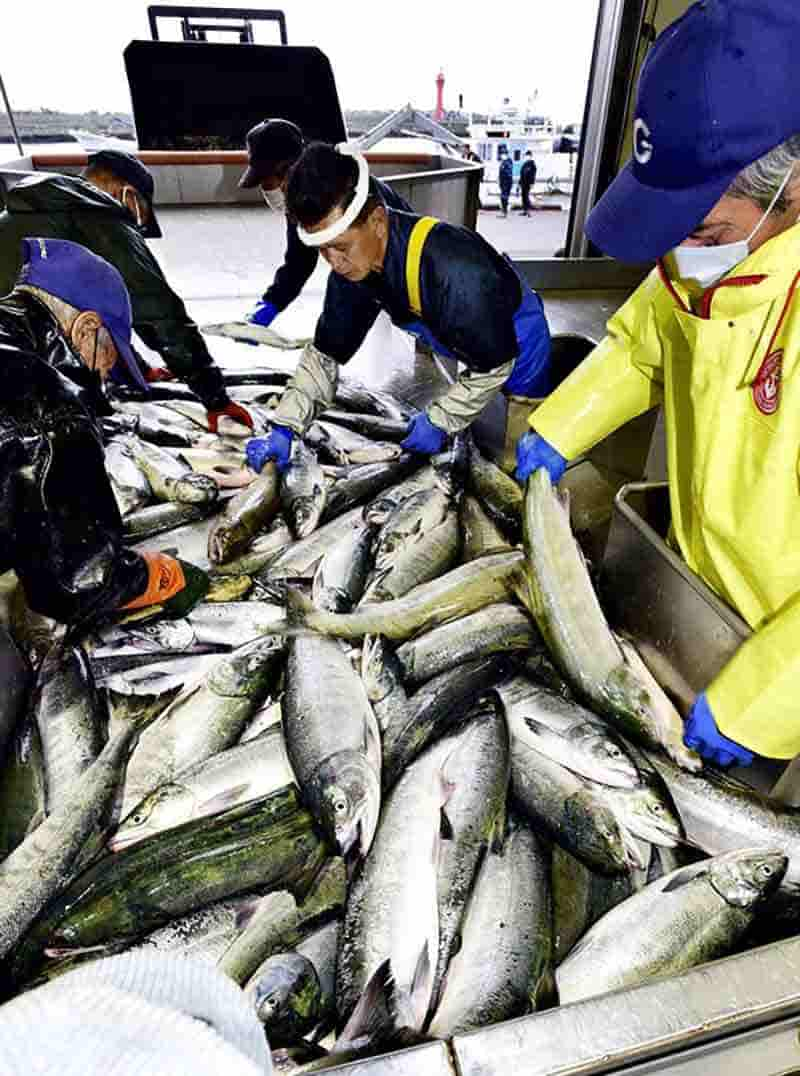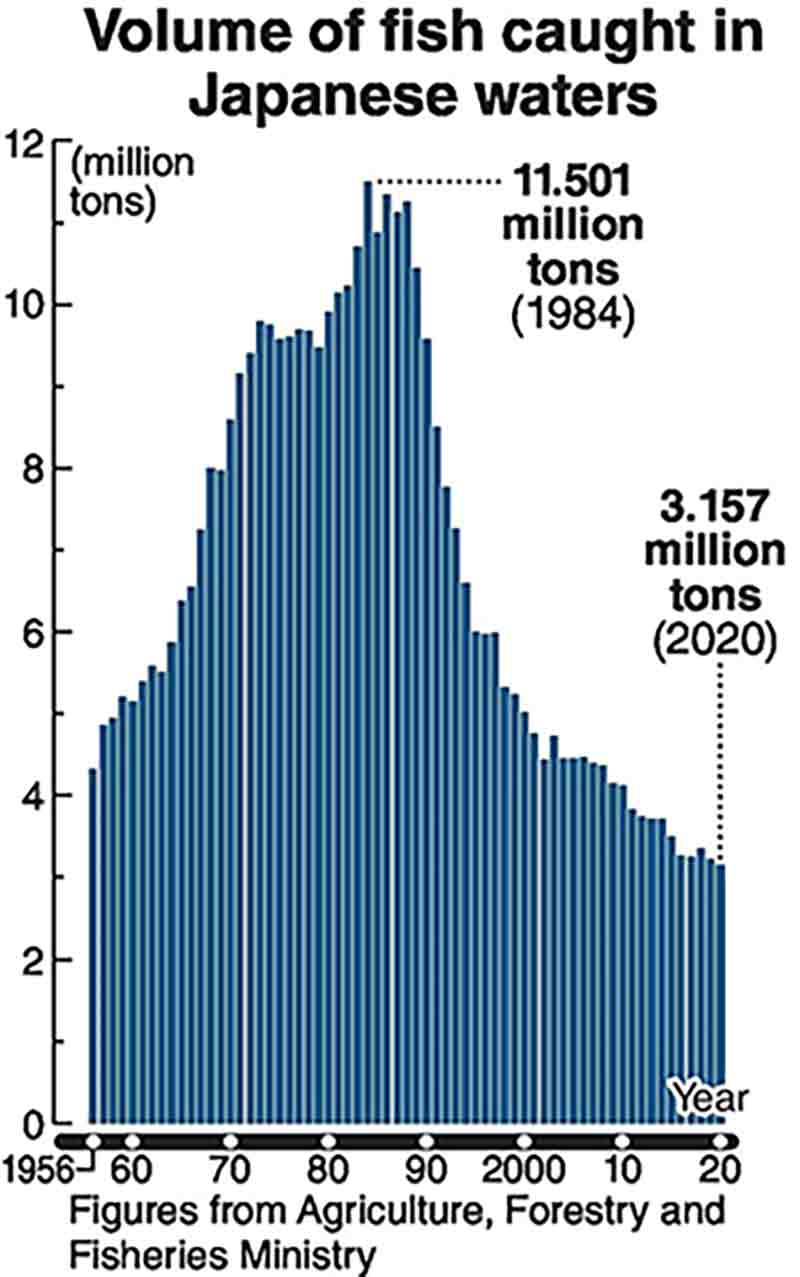
Salmon are sorted after being unloaded at a port in the town of Shiranuka, Hokkaido, on Oct. 15.
November 28, 2021
Fish catches in Japanese waters have plunged in recent years — the catch volume hit a record low in 2020 for the second consecutive year and has dropped to about 30% of the peak in the 1980s.
Massive deaths of sea urchins and salmon have been reported off Hokkaido, and a government panel of experts has suggested dismal catches could continue due to global warming and other factors. With their backs to the wall, some fishermen are trying new approaches, such as catching different varieties.
Taro Kimura, a 38-year-old fixed-net fisherman who catches autumn salmon, sighed despondently.
“On some days, more than half of the fish caught in my net are already dead,” said Kimura, who operates from the town of Shiranuka, Hokkaido. “It truly is a natural disaster.”
According to the Hokkaido prefectural government, a massive red tide — a type of harmful algal bloom — that occurred off the Pacific coast from September caused the deaths of about 27,700 salmon and about 2,700 tons of sea urchin. The red tide had caused about ¥8 billion in damages as of Nov. 12.
Kimura’s salmon catch has plunged to one-fifth the level 15 years ago, and he has been operating at a loss for the past few years.
“The number of salmon swimming upstream to spawn will drop, so I think this could affect future catches,” Kimura said.
A red tide commonly occurs in warmer waters. However, the Hokkaido outbreak involved toxic plankton that can survive even in cooler water being found in Japan for the first time.
“We never expected this could happen,” said Makoto Hatakeyama at the Hokkaido Research Organization’s Fisheries Research Department.
Marine heat waves
According to the Agriculture, Forestry and Fisheries Ministry, the total volume of fish caught in Japan in 2020, excluding those raised through aquaculture, declined about 2.2% from the previous year to about 3.15 million tons. This volume has been constantly dropping since peaking at about 11.5 million tons in 1984.
Catches of three highly popular kinds of fish also have fallen away. Fishermen netted about 220,000 tons of Pacific saury in 2011 but this had plummeted to about 30,000 tons in 2020. Likewise, the catch of Japanese flying squid dropped 80% over this period and varieties of salmon by about 60%.

Several causes have been suggested for this sharp decline. One leading theory is rising sea temperatures caused by global warming, while changes in ocean currents also have been cited.
In June, an expert panel at the Fisheries Agency pointed out the possibility that fish found off Japan’s coast have moved offshore to waters where the temperature remains colder, and that the population of fish that prey on young fish has increased. The panel also raised concern that the poor catches could continue around the nation for an extended period.
A joint research project by the Japan Agency for Marine-Earth Science and Technology (JAMSTEC) and Hokkaido University found that marine heatwaves — a phenomenon in which the sea surface temperature stays high — occurred every summer off the coast of Hokkaido and the Tohoku region from 2010 to 2016.
According to the Japan Meteorological Agency, in July the sea surface temperature in the northern Sea of Japan and off southeastern Hokkaido was about 2 C to 4 C higher than normal years.
“It can be assumed that a marine heatwave also occurred this summer,” said Toru Miyama, a senior scientist at JAMSTEC. “The marine environment is changing dramatically.”
Catching what’s out there
Fish originally found in warm waters are now being caught even in seas around northern Japan.
Catches of yellowtail — a fish that had been caught relatively rarely in Hokkaido — have surged around the prefecture. In 2019, about 10,873 tons of yellowtail were netted, an about 16-fold increase from the volume caught in 2004. This fish is now even being sold as a local specialty.
Catches of pufferfish and lobster have soared off Fukushima Prefecture, so moves to brand these as local delicacies are under consideration.
Since 2019, saury fishermen and others from Iwate Prefecture have been trialing a sardine fishing operation. Saury fishing grounds are now found farther from Japan, and catching the fish in coastal waters has become much more difficult. Changes in ocean currents have been suggested as one cause of this.
By contrast, sardine hauls have been positive overall: 4,889 tons were caught in the trial’s first year, and 3,317 tons in the second.
“This won’t fully cover the loss in income suffered by saury fishermen, but it will help them balance their budgets,” said an official at fisheries promotion section of the Iwate prefectural government.
Landlocked prefectures spot openings
According to the Fisheries Agency, the global production volume through aquaculture, including in fresh water, has about quadrupled in the past 20 years, and now accounts for more than half of the fishing industry’s entire production volume. Domestically, the figure remains at about 20%, but at a time of woefully poor catches, fish raised in land-based facilities are gaining considerable attention as an option that would not be affected by changes in the marine environment.
Since 2017, West Japan Railway Co. has been cultivating mackerel in the town of Iwami, Tottori Prefecture. This process uses naturally filtered underground seawater, which leaves the fish less susceptible to parasites and allows the soft roe to be eaten raw.
Even prefectures without a coastline are tapping this industry. Pacific white shrimp is being raised in Yamanashi Prefecture, and Saitama Prefecture is home to a facility cultivating mackerel. Since 2019, the village of Tenkawa, Nara Prefecture — which is known for its clear water — has been cultivating pufferfish in a building of a defunct school. The first shipment of the fish is scheduled for this winter.
Top Articles in Business
-

Prudential Life Insurance Plans to Fully Compensate for Damages Caused by Fraudulent Actions Without Waiting for Third-Party Committee Review
-

Narita Airport, Startup in Japan Demonstrate Machine to Compress Clothes for Tourists to Prevent People from Abandoning Suitcases
-

Japan, U.S. Name 3 Inaugural Investment Projects; Reached Agreement After Considerable Difficulty
-

Toyota Motor Group Firm to Sell Clean Energy Greenhouses for Strawberries
-

SoftBank Launches AI Service for Call Centers That Converts Harsh Customer Voices into Softer Voices
JN ACCESS RANKING
-

Japan PM Takaichi’s Cabinet Resigns en Masse
-

Japan Institute to Use Domestic Commercial Optical Lattice Clock to Set Japan Standard Time
-

Israeli Ambassador to Japan Speaks about Japan’s Role in the Reconstruction of Gaza
-

Man Infected with Measles Reportedly Dined at Restaurant in Tokyo Station
-

Videos Plagiarized, Reposted with False Subtitles Claiming ‘Ryukyu Belongs to China’; Anti-China False Information Also Posted in Japan






















